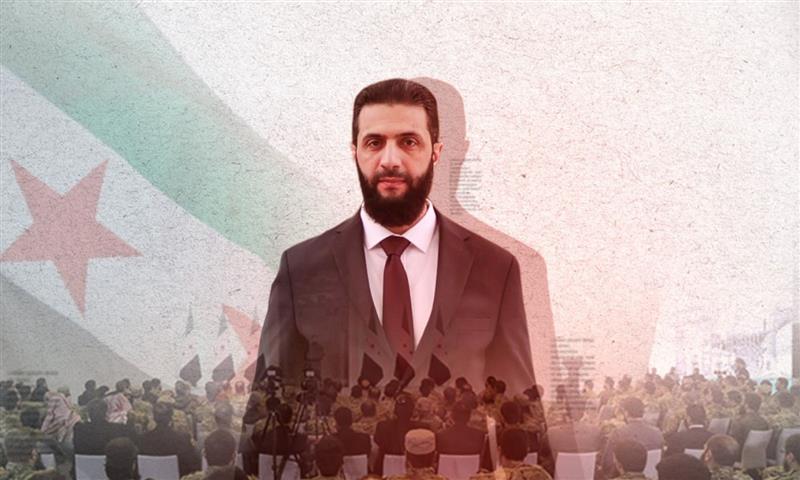



Khaled al-Jeratli | Hassan Ibrahim | Jana al-Issa | Ali Darwish
Military attire dominated the meeting held at the People’s Palace in the Syrian capital, Damascus, titled “Victory Conference,” which resulted in a series of decisions about two months after the fall of Bashar al-Assad’s regime. These decisions brought radical changes to the sequence of events that have accelerated recently in Syria.
One of the most notable decisions was the appointment of Ahmed al-Sharaa as President of the Syrian Arab Republic during the transitional phase, alongside other decisions that included dissolving the army of the regime, the People’s Assembly, suspending the constitution, and dissolving the parties of the National Progressive Front.
Video recordings and images coming from the meeting hall carried a number of observations related to the decisions issued by the new authorities. The military representation was not complete, as a part of the southern Syrian factions was absent, notably the factions from As-Suwayda, in addition to one of the largest military factions in Syria, the Syrian Democratic Forces (SDF) in northeastern Syria, which is still in negotiations with the Damascus government to reach a solution for its integration into the Ministry of Defense.
The decisions to dissolve the army, suspend the constitution, and dissolve the political parties that have long formed the backbone of the Assad family’s rule in Syria were partly expected, but they came individually from the military faction that led the military operations towards Damascus and toppled the Assad regime.
Enab Baladi discusses in this report with experts and researchers the aftermath of these decisions, and what may result from them in the military, political, and legal arenas.
“Victory Conference”
On January 29, the General Command in Syria announced Ahmed al-Sharaa’s assumption of the presidency of Syria for the transitional phase, the dissolution of the People’s Assembly, the army, and revolutionary factions, and the suspension of the constitution.
The spokesperson for the Military Operations Administration, Colonel Hassan Abdel Ghani, mentioned several decisions during the conference, the most prominent of which were:
- Ahmed al-Sharaa will take over as president of Syria during the transitional phase and perform the duties of the President of the Syrian Arab Republic, representing it in international forums.
- Al-Sharaa is empowered to form a temporary legislative council for the transitional phase, which will exercise its duties until a permanent constitution for the country is established and comes into effect.
- Dissolution of the ruling Baath Party in Syria under the previous regime and the parties of the National Progressive Front, along with their affiliated organizations, institutions, and committees, with a ban on re-establishing them under any other name, returning all their assets to the Syrian state.
- Dissolution of all security agencies of the previous regime in their various branches and names, along with all the militias created by it, and the establishment of a new security institution.
- Dissolution of the previous regime’s army and rebuilding the Syrian army “on national bases.”
- Dissolution of the People’s Assembly and the committees derived from it.
- Abrogation of the 2012 constitution and suspension of all exceptional laws.
- Dissolution of all military factions, revolutionary and political civilian bodies, and their integration into state institutions.
- Declaration of December 8th of each year (the date of the regime’s fall) as a national holiday.
Al-Sharaa delivered a speech during the conference to military leaders that was not broadcast live, but the official Syrian news agency (SANA) transmitted excerpts from the speech.
Al-Sharaa stated that “what Syria needs today more than ever, as we decided in the past to liberate it, is the duty to strive for its rebuilding and development.”
He outlined Syria’s current priorities as filling the power vacuum, preserving civil peace, building state institutions, and working on developing an economic infrastructure while restoring Syria’s international and regional stature, according to al-Sharaa.
Additionally, the Syrian Foreign Minister, Asaad al-Shibani, and many military faction leaders delivered speeches.
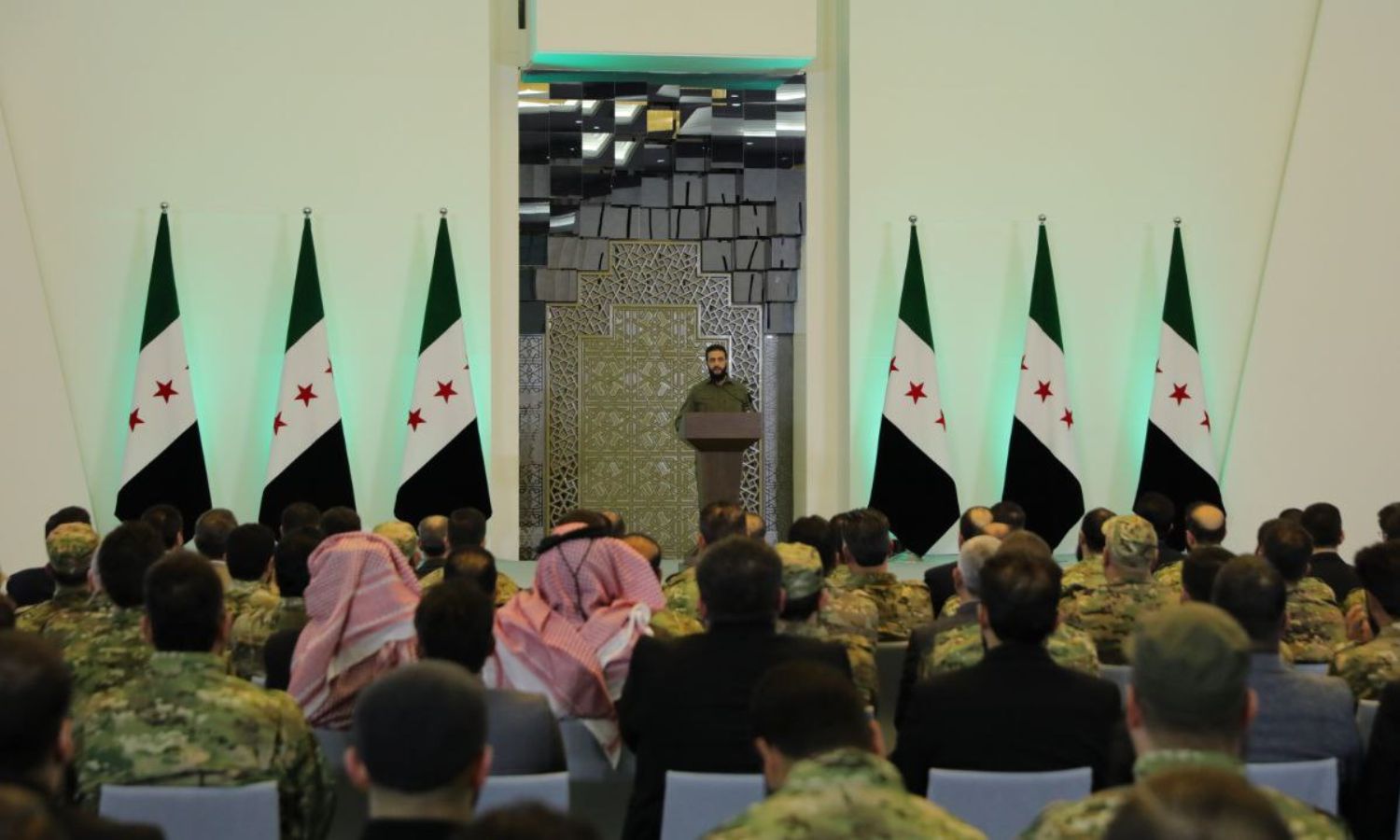
Syrian president for the transitional phase, Ahmed al-Sharaa, delivers a speech at the Victory Conference – January 29, 2025 (General Command)
Militarily, the situation remains incomplete and is in the process of arrangement across the entire Syrian geography. This was confirmed by the military presence during the “Victory Conference,” which notably lacked leadership from factions in As-Suwayda in southern Syria, and leaders from the SDF. Meanwhile, the conference included the Ministry of Defense and most of the military faction leaders and representatives from Syria, including leaders from the Syrian National Army (SNA), Hayat Tahrir al-Sham (HTS), the Free Syrian Army stationed at the al-Tanf base, and the Eighth Brigade in Daraa.
The “Victory Conference” resulted in decisions related to the military context in Syria, most notably the dissolution of the previous regime’s army and the rebuilding of the Syrian army “on national bases,” as well as the dissolution of all security agencies of the previous regime with its various branches and names, and all the militias created by al-Assad and his allies, along with the formation of a new security institution.
The perspective of the Syrian administration on the rebuilding of the army appeared incomplete, especially in light of the absence of representation from factions controlling vast areas in northeastern Syria and the factions in As-Suwayda.
As for the SDF stationed in the east of the Euphrates, negotiations with Damascus are ongoing, with parties trying to create military conflict between them. According to SDF commander Mazloum Abdi, there has been coordination to avoid this conflict.
On the other hand, Ahmed al-Sharaa stipulates three fundamental rules for resolving the issue: there should be no division in Syria in any form, even if federalism, foreign fighters causing problems for neighboring countries must leave, and weapons must be restricted to the state only.
After Abdi’s announcement of his readiness to engage in military integration with the Syrian opposition and join the new Syrian army, he rejected joining the new army as individuals, but rather as a military bloc.
The “Victory Conference” took place as the Ministry of Defense continued its efforts to unite the factions under its umbrella as individuals rather than groups, amidst moves by Minister Murhaf Abu Qasra, following diverse military meetings and separate statements from factions and military groups expressing their readiness to join the ministry’s structure.
A leader from Daraa who attended the “Victory Conference” told Enab Baladi that the leadership informed them 24 hours before the conference of the necessity to attend a meeting of all military factions at the People’s Palace in Damascus, without any clarifications about the reason.
The leader, who preferred to remain anonymous as he was not authorized to speak to the media, added that during inquiries about the reason for the meeting, it became clear that it was arranged hastily before the visit of the Emir of Qatar to Syria, because countries want legitimacy for the president, especially before a visit from a head of state, and to address world leaders with a recognized presidential figure from the revolutionary factions until a constitution is written and presidential elections are held.
Therefore, there was a consensus among the military factions to appoint Ahmed al-Sharaa as president of the Syrian Republic during the transitional phase, which has not been specified in duration, but the leader said that the transitional period is a timeframe that renews every six months.
The leader emphasized that Syria needs a presidential administrative organization to address countries, initiate pressure to lift sanctions, stimulate the economy, and ensure the people’s livelihood and salaries for employees.
Regarding the dissolution of the military factions, the leader told Enab Baladi that the decision to disband had been issued, but the implementation needs a long timeframe until the structure of the Ministry of Defense is crystallized.
A leader in the Syrian National Army (which was active in northern Aleppo) also preferred not to disclose his name as he was not authorized to speak to the media, told Enab Baladi that the disbandment of the factions will be done gradually, noting that the meeting confirmed the readiness of the factions and their irrevocable agreement to come under the banner of the Ministry of Defense and state institutions.
The leader stated that the decision to disband the factions is definitive, and we are still awaiting arrangements from the Ministry of Defense and what it requires in terms of coordination and concerted efforts.
Enab Baladi contacted leaders from the factions in As-Suwayda, but received no response by the time this report was published, and the factions did not provide any clarification through their channels about the reason for their absence or their stance on the conference or the decisions issued from it.
The Ministry of Defense in the interim government of Damascus also did not respond to the inquiries posed by Enab Baladi regarding the decision to disband the factions and its mechanisms, even by the time this report was finalized.
The Minister of Defense in the interim government of Damascus, Murhaf Abu Qasra, said during a meeting in the capital Damascus, attended by Enab Baladi on January 22, that the Ministry of Defense is an institutional case, and now we can build an army, focusing on bridging the gap between the armed forces, and restoring an army whose goal is to defend the homeland, not personal or sectarian interests at the expense of other Syrian components.
He added that the ministry met with more than 70 factions to clarify its vision, and the factions expressed a desire to engage with the ministry, as it is not feasible for the factions to enter the ministry while remaining in the same structure.
A committee of senior officers was formed to structure the new military institution, and the ministry needs about two months to stabilize the appointments in the armed forces, according to Abu Qasra.
Colonel Mustafa Bakour, spokesperson for Jaish al-Izzah, one of the factions of the Military Operations Administration, told Enab Baladi that the disbanding of factions and merging them into one army is “an important step towards restructuring state institutions, especially military and security ones.”
Bakour added that the disbandment of the factions came at an appropriate time with the existence of a Ministry of Defense, and the matter should not be linked to settling the situation with the SDF or other groups that have transformed in light of the revolution’s victory and the existence of a new state from revolutionary factions into armed groups beyond the state linked to external agendas.
As for the absence of some figures and names of some factions, it is related to their willingness to participate in building the new state on the basis of unity of land and people in a free Syria, according to Bakour.
In these exceptional circumstances that the new Syrian state is going through, it is unreasonable to remain outside the national consensus in preserving the unity and cohesion of the Syrian society. Moreover, having some reservations on certain positions and ideas does not justify any of the factions or individuals singing outside the tone of one homeland, as in an atmosphere of responsible freedom, disagreements and problems can be addressed between brothers in the same house within the framework of family and common interest.
Colonel Mustafa Bakour, Spokesperson for Jaish al-Izzah
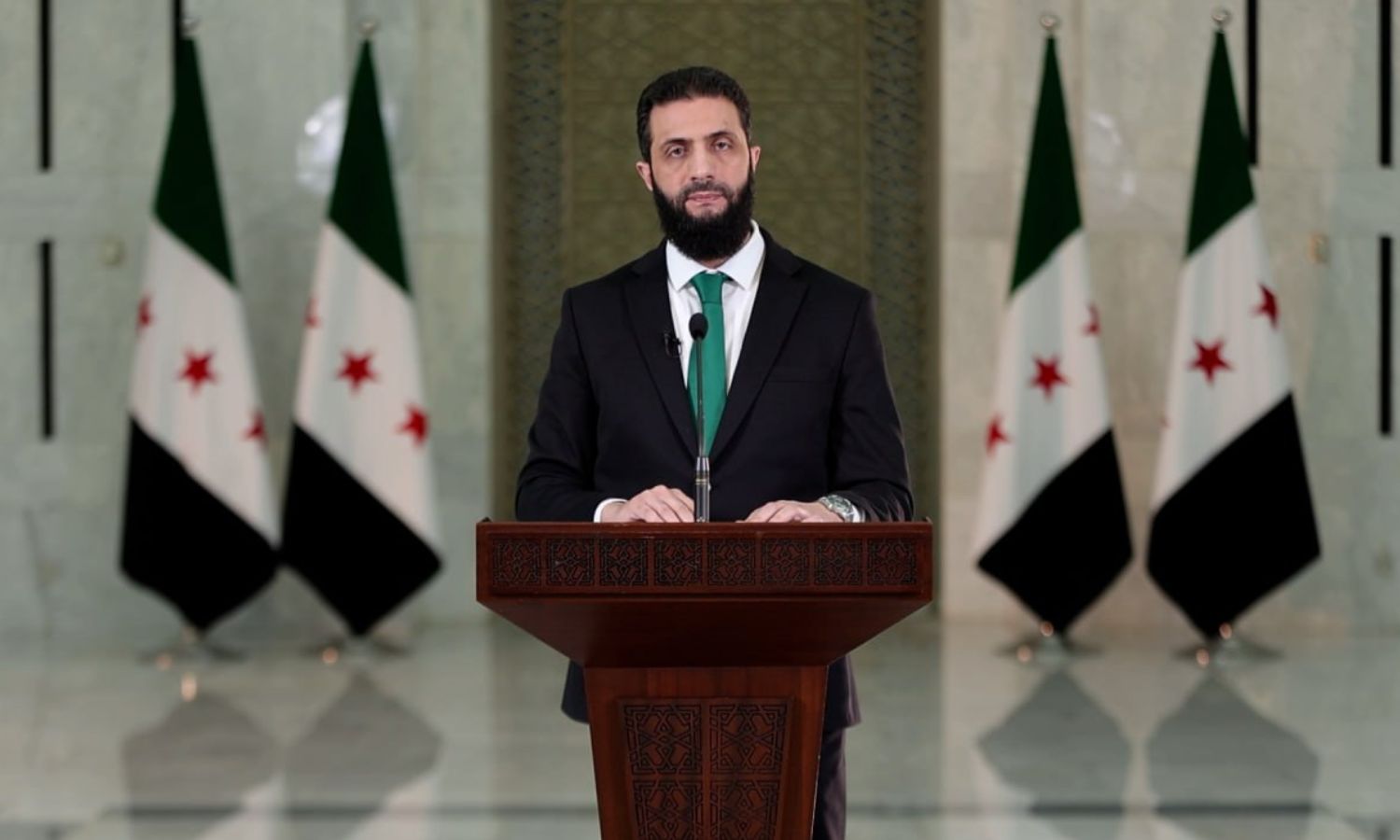
Syrian president for the transitional period, Ahmed al-Sharaa, addresses Syrians – January 30, 2025 (Syrian Presidency)
The roadmap announced by Ahmed al-Sharaa regarding the annulment of the 2012 Constitution, the suspension of all exceptional laws, and the dissolution of the People’s Assembly has opened the door to questions concerning the timing for the announcement of a new constitution.
The announcement of the dissolution of the constitution and the People’s Assembly leaves a constitutional void that could complicate the transitional period in the country from a legal standpoint, especially since the constitutional declaration has not taken place to fill this gap.
In the coming period, al-Sharaa is expected to announce a preparatory committee to select a transitional legislative council that fills the gap in the transitional phase, based on his “mandate of duties as president of the republic” and the decision to dissolve the People’s Assembly.
Once the announcement of the preparatory committee for the national dialogue conference is completed, it is expected that a “constitutional declaration” will be announced to serve as the legal reference for the transitional phase, without specifying a timeline for all these steps.
In the legal context, most experts agree on the necessity of hastening the announcement of an interim constitutional declaration, while ensuring diversity in the committee responsible for drafting it.
Professor in the Faculty of Law at the University of Damascus, Hassan al-Bahri, stated regarding the legitimacy of decisions made after the “Victory Speech” that, from a constitutional perspective, following the success of revolutions, there is usually a revolutionary council called the “Revolution Leadership Council” tasked with managing the transitional phase and issuing necessary decisions to impose security and achieve stability in the country; this happened in the Syrian case, clarifying that the council here is composed of leaders of all factions of the revolution and the armed opposition.
Al-Bahri pointed out the necessity for the interim president to take three steps that are considered priorities in the constitutional context of the country, which include:
In light of the absence of any constitutional document regulating or defining the powers of the Syrian president during the transitional phase, Ahmed al-Sharaa, lawyer Aref al-Shaal clarified his constitutional status and the entities in which he holds absolute authority.
Al-Shaal stated that according to this, al-Sharaa is considered the head of the executive authority and enjoys full powers to exercise this position based on the principle that “the unconditional status shall apply unless otherwise a restriction is stated.” Thus, he has the authority to issue organizational or individual decrees and possesses complete authority over the state’s executive apparatus regarding appointments and dismissals, starting from the prime minister, ministers, ambassadors, general directors, and down to the smallest employee in any government department.
As for the legislative authority, al-Sharaa has been granted absolute delegation to appoint a legislative council without being bound by the number of members, specifications, representation ratios, or others.
According to al-Shaal, this council is responsible for issuing, canceling, or amending laws, and it does not have the right to issue legislative decrees.
Regarding the judicial authority, in accordance with the provisions of Article “65” of the Judicial Authority Law, al-Sharaa is considered the head of the Supreme Judicial Council, represented by the Minister of Justice.
Syrian lawyer Ghazwan Kurunful described the current phase the country is experiencing as the “legitimacy of the victorious,” marked by a constitutional vacuum. He expressed his hope for a national consensus on a constitutional declaration that would establish constitutional legitimacy for the current authority.
Kurunful believes that the delay in the constitutional declaration hinders obtaining constitutional legitimacy that would assist countries in officially recognizing the legitimacy of the new authority in a legal sense. This would allow for discussing deeper and more comprehensive issues beyond the current general discussions, such as changing diplomatic staff, issuing legal documents, and managing contracts and investments in an open and comfortable manner within a reassuring legal framework for countries and global financial institutions.
There is hope pinned on hastening the institutionalization of the current authority through a nationally agreed-upon constitutional declaration.
Lawyer Ghazwan Kurunful
Regarding the nature of the entities and personalities that should be included in the preparatory committee to ensure diversity and avoid the appointment of a homogenous committee, Kurunful pointed out the necessity of including representatives from various political forces, currents, and parties, independent national figures, and legal professionals from among judges, lawyers, and academics while considering religious and geographical diversity.
He stated that after issuing a constitutional declaration, there would not be significant changes in the short term, adding that the country is awaiting a national dialogue conference and an agreement on a founding body to draft a permanent constitution for the country.
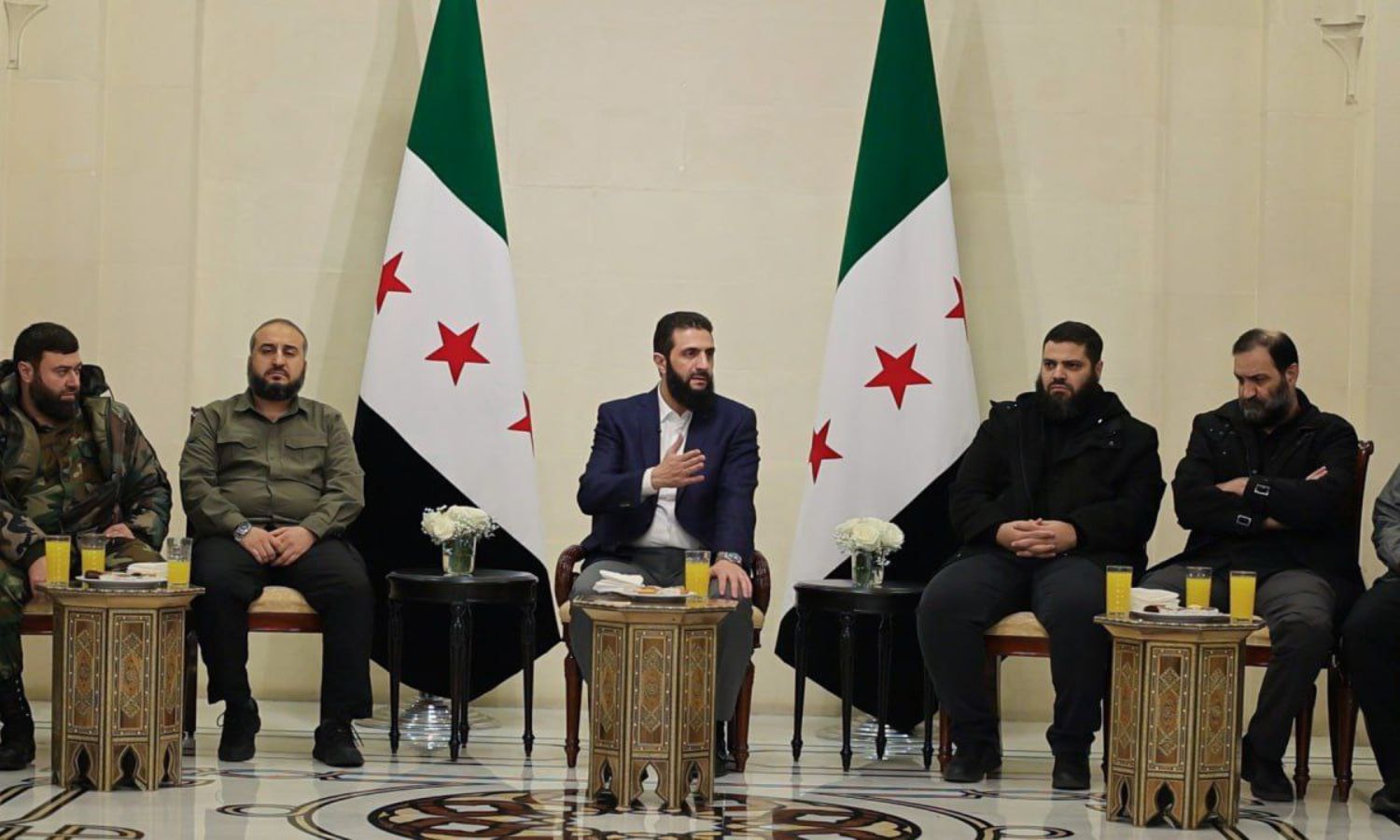
Syrian transitional president Ahmed al-Sharaa during his meeting in Damascus with factions leaders – December 24, 2024 (Free Syria)
Much like the military and constitutional affairs, other decisions have been issued from the “Victory Conference” concerning the political base of the ousted regime, most notably the dissolution of the Arab Socialist Baath Party, under which the Assad family ruled Syria for over 50 years.
The party has a bad reputation among Syrians, especially among the supporters of the Syrian revolution, as it has long been associated with the military machine that destroyed Syrian homes and punished individuals based on their political affiliations. Meanwhile, another experience of dissolving the Baath Party had negative repercussions on society, especially given the situation in neighboring Iraq.
Dr. Samir al-Abdullah, the director of policy analysis at the Harmoon Center for Contemporary Studies, believes that the issue of dissolving the National Progressive Front parties will have little notable impact on Syrian society.
He added that these parties have long been “effectively dead.”
He explained that, apart from the Baath Party, which had large numbers of members, the other parties were “nominal,” lacking any popular weight, as they were subordinate to the Baath or under the control of the Assad leadership, executing its directives and working according to its instructions, while most are not suitable for the current timeline, such as communist and unification parties.
The National Progressive Front is a coalition made up of several national, socialist, and communist parties, led by the Arab Socialist Baath Party. The front’s central leadership consists of general secretaries of the parties and organizations under its umbrella, along with members of the Baath Party, with a stipulation that Baathist members constitute more than half of the central leadership seats.
The central leadership of the front is the core of its operations, as it has branch leaderships in provincial centers formed by decision of the central leadership, consisting of representatives from front parties and other elements representing progressive national forces or directions, as stipulated in Article “11” of its foundational charter.
In provincial centers, the central leadership’s decisions dictate the formation of the offices and committees deemed necessary to carry out its various activities under Article “12” of the foundational charter, with branch leaders and committees limited to executing decisions and instructions from the central leadership and managing their activities within prescribed limits.
Regarding socialist parties, researcher Samir al-Abdullah believes their global influence has declined since the fall of the Soviet Union. However, the situation differs for nationalist parties, which might reinvent themselves under different names, given that some still believe in Arab or even Syrian nationalist thought.
The researcher downplayed the importance of any consequences arising from dissolving the Baath Party, considering that there will be no negative aftermath like what happened in Iraq, especially since the issued decision so far only involves dissolution without criminalizing or pursuing its members, unlike what happened there.
He added that most Baath members in Syria did not join out of conviction in its ideology but for opportunistic motives and a desire to get closer to the authority. Thus, as long as the decision to dissolve the party and transfer its assets to the state was made in this current form, it is expected that everyone will quickly distance themselves from it.
In the Iraqi model, dissolving the Baath Party resulted in security repercussions that pushed pursued members toward opposing the regime in Iraq, with some joining armed organizations like the Islamic State and al-Qaeda.
Al-Sharaa as president: An expected step
The appointment of Ahmed al-Sharaa as president of the Syrian Arab Republic during the transitional phase was not a surprising event, according to researcher Samir al-Abdullah, and it cannot yet be viewed as an exclusion of other parties.
Al-Abdullah stated to Enab Baladi that there are no political or national forces in Syria that possess significant influence in the current scene, as is the case with the parties that attended the “Victory Conference.”
The current phase necessitates a single central leadership, according to al-Abdullah, to control the situation, collect weapons, and achieve security stability. However, the most important aspect is how al-Sharaa will act in the upcoming period.
The researcher linked potential changes to the steps that al-Sharaa will take: “Will he seek to enhance participation and openness to everyone, or will he maintain authority within his narrow circle of followers and close associates?”
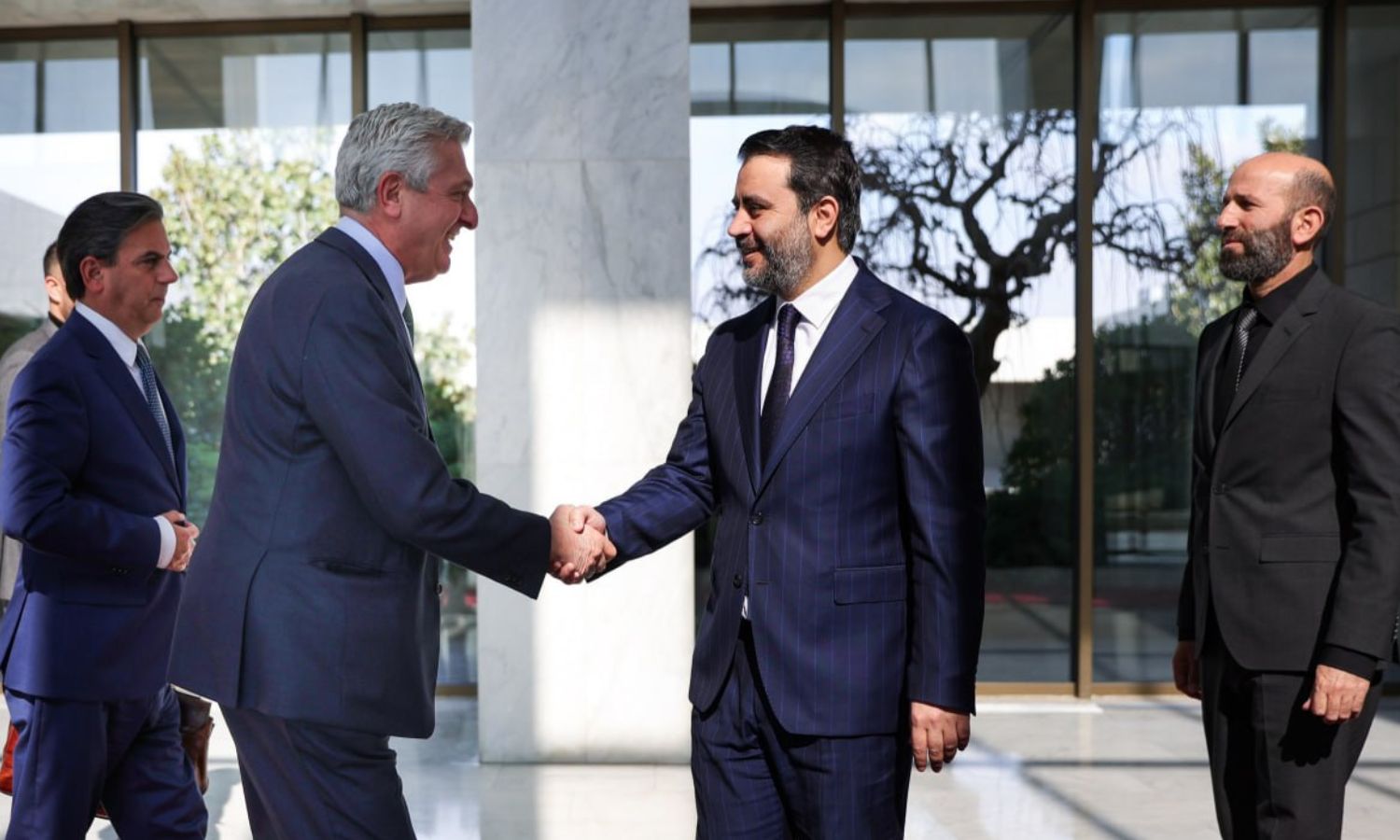
Foreign Minister Asaad al-Shibani and Filippo Grandi, the UN High Commissioner for Refugees (Syrian Presidency)
In the wake of the “Victory Conference,” the Syrian president in the transitional phase, Ahmed al-Sharaa, appeared to announce the priorities that will be the focus in the upcoming period.
Al-Sharaa stated that his administration will focus on several key points, foremost among them achieving civil peace.
The second point is “pursuing the criminals who were involved in Syrian bloodshed and committed massacres and crimes,” whether they are hiding inside the country or fled abroad through genuine transitional justice.
In the third phase, the administration of the transitional phase will focus on completing the unity of Syrian territories, regaining control over all of Syria, and imposing sovereignty under a single authority and on one land, according to al-Sharaa.
The Damascus government controls most of Syrian territory, either militarily or through coordination with local factions (as in As-Suwayda), except for the areas controlled by the Syrian Democratic Forces (SDF) in northeastern Syria.
Al-Sharaa also stated in a speech directed at the Syrians that building strong state institutions based on efficiency and justice, without corruption, favoritism, or bribery, is a priority.
He emphasized the need to establish the foundations of a strong economy that restores Syria’s regional and international standing and provides real job opportunities to improve living conditions and restore basic lost services.
Syrian researcher Raghda Zidan, a former member of the Syrian Constitutional Committee, believes that it is natural for al-Sharaa to outline the stages of the political process in the upcoming phase, not only to address the international community and convey messages of a desire for cooperation and engagement but also to speak to the Syrian people, who have long awaited al-Sharaa’s address to know what lies ahead for Syria, away from media rumors and political analysts’ speculations.
Zidan added that these steps are essential for legitimizing rule in Syria, as revolutionary legitimacy alone is not enough to transition to the legitimacy of governance, which is represented by the legal and legislative framework for all steps of the ruling institution during the transitional phase and its powers, leading to the establishment of a permanent constitution and the preparation for a proper electoral process.
Zidan also stated that al-Sharaa’s speech, although limited to a few minutes, contained a clear outline of the forthcoming steps and included a proper depiction of the transitional process, which will instill confidence on both external and internal levels and contribute to progressing towards a serious phase of lifting sanctions and reconstruction efforts.
Internally, Zidan believes that Ahmed al-Sharaa’s statements will serve as a starting point for building and renovating state institutions and activating the required institutional work within Syria.
if you think the article contain wrong information or you have additional details Send Correction